|
|
|
Sort Order |
|
|
|
Items / Page
|
|
|
|
|
|
|
| Srl | Item |
| 1 |
ID:
177944
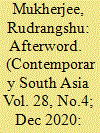

|
|
|
|
|
| Summary/Abstract |
This afterword reflects on the intellectual life of Chanchalkumar Chattopadhyaya who died at the age of 89 in 2004. Mr Chattopadhyaya, who lived in a small flat in north Calcutta, taught himself Greek, Latin and French, and it was the learning of the Italian language which introduced him to his life's great love, Dante. His other great love was western classical music. Mr Chattopadhyaya, who I refer to in this text as Chanchalbabu, represents a lost sensibility which was once integral to the culture and history of Calcutta. Despite being scoffed at, he, along with the other marginal characters in this anthology who are navigating, moulding and defying mainstream aesthetic narratives in Calcutta, remained committed to the passionate pursuit of knowledges which drew upon the best of European culture.
|
|
|
|
|
|
|
|
|
|
|
|
|
|
|
|
| 2 |
ID:
177936
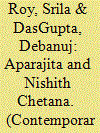

|
|
|
|
|
| Summary/Abstract |
This article examines self-making projects and the desire for respectability within queer lives in Kolkata, across distinct class-caste affiliations. We argue the desire for queer respectability take virtual forms, sartorial fashioning, and yet remains a convoluted project mirroring Kolkata’s relationship with neoliberal capitalism. The authors engage with a young lesbian identified activist and a young male fashion designer whose sexual identity remains tacit. Their virtual and real interactions reveal how both the characters conceal their caste and class status through projects of sartorial fashion in order to be read as appropriately queer. The article argues for understanding sexual and gender identities in relation with class, and caste status, as well as ethnic and religious identities, thereby revealing how the liberatory potentials of queer activism is a form of emergent neoliberal governmentality within contemporary India.
|
|
|
|
|
|
|
|
|
|
|
|
|
|
|
|
| 3 |
ID:
177941
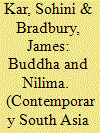

|
|
|
|
|
| Summary/Abstract |
This article explores the lives and careers of two people from left-leaning, political families in Kolkata. Their formative years and political horizons were shaped by the Left Front government in West Bengal (1977–2011), and they now negotiate the aftermath of the communists’ defeat in 2011 in their day-to-day lives. Buddha was born in Bangladesh, and is now a grassroots leader of the Communist Party of India (Marxist) in suburban Kolkata. His story encapsulates the struggle of building a political career in the aftermath of electoral defeat, mixing the pragmatism of being an important organizer or ‘party man’ with his commitment to cultural politics. Nilima is a young woman from a Leftist family employed by a microfinance institution (MFI). Her upbringing around the party and imbued with communist ideological values now conflicts with a thoroughly neoliberal workplace. Their experiences both in terms of their activism as well as their day-to-day experiences of work in Kolkata’s neighbourhoods offers insights into the contemporary political moment in the city after communism.
|
|
|
|
|
|
|
|
|
|
|
|
|
|
|
|
| 4 |
ID:
177934
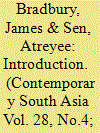

|
|
|
| 5 |
ID:
177943
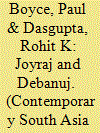

|
|
|
|
|
| Summary/Abstract |
In this article we want to evoke two characters that each suggest different points of departure for thinking about Kolkata as a queer kind of space. By this we want to evoke something of the sexual geography and life-ways of the city, but to go beyond this standpoint too, to question ways in which ethnographic characters might be evoked in respect of any context, Kolkata or elsewhere. In one sense this is to open out a perception of Kolkata as a scene of many sexual life-worlds, inviting a plural kind of analysis suggestive of a multiplicity of perspectives; persons/subjects each with a unique viewpoint to be captured. The two characters we explore here each draw attention to issues of belonging and migration, of both wanting to move to and away from Kolkata; creating new life-worlds via the city amidst its shifting sexual geographies, class and caste divisions, and wider diasporic connections and fault-lines. Kolkata itself emerges as an attribute of the characterisations to hand: sometimes as distinct mise-en-scene, at others a kind of sensibility or resonance field for understanding self and others.
|
|
|
|
|
|
|
|
|
|
|
|
|
|
|
|
| 6 |
ID:
177937
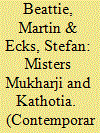

|
|
|
|
|
| Summary/Abstract |
This article reflects on the meanings of money in the lives of two very different people from Kolkata. Mr Mukharji, a 60 year-old Bengali man, was a branch manager of a state bank who devoted his life to Tantrik Yoga. Mr. Kathotia, a Marwari man, was a wholesale paper dealer, with an interest in stamp and coin collecting. After first developing a theoretical framework on the sociology of money, the authors go on to describe their encounters with these two people, their different ethnic belongings, their social and working lives and what matters to them in life.
|
|
|
|
|
|
|
|
|
|
|
|
|
|
|
|
| 7 |
ID:
177938
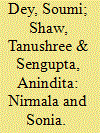

|
|
|
|
|
| Summary/Abstract |
In this article, we explore the duality and performativity of bodies as they move through multiple social, sexual and fiscal economies of Kolkata. We offer the story of Sonia, a middle-aged feminine man, who despite a number of obstacles within his family, experiments with a range of sexual identities, and in the process challenges the notion of conformist heteronormative trajectories in the city. Our second character, Nirmala, works as a commercial surrogate in Kolkata. Nirmala's story shows how the cultural script of the pregnant body, associated with heterosexual intercourse and motherhood, is defied by the renting of wombs for profit within the assisted reproductive sector in the city. The personal accounts of Sonia and Nirmala eventually tell a story of Kolkata itself. They underline its transition from older post/colonial economies towards neoliberal aspirations and gendered freedoms. These processes of change remain imprinted in the rebellious, unorthodox bodies of ordinary citizens.
|
|
|
|
|
|
|
|
|
|
|
|
|
|
|
|
| 8 |
ID:
177942
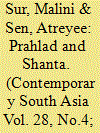

|
|
|
|
|
| Summary/Abstract |
This article explores the irreverent and supposedly irrational actions of two protagonists, Prahlad and Shanta, characters that the authors encountered during the course of their extended fieldwork in Kolkata. Prahlad is an Oriya migrant plumber who passionately seeks god at the cost of making money, and resists adhering to rational economic behaviour in the city. Shanta is a grieving mother who relentlessly seeks justice for her son’s disappearance during a revolutionary movement that consumed the majority of urban youth in the 1970s. Family, friends, neighbours and employers describe and at time dismiss rgen as pagla or insane. This article foregrounds these expressions of paglami or madness in Kolkata. We ask: how does close ethnographic attention to quotidian madness – its articulations, exploitations and resistances – enable us to rethink urban lives? We argue that dissension, alienation and ‘unreasonable fixations’ are affective thresholds of a changing city. They corroborate the ways in which the city’s transforming political landscape impinges on its ordinary lives.
|
|
|
|
|
|
|
|
|
|
|
|
|
|
|
|
| 9 |
ID:
177939
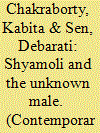

|
|
|
|
|
| Summary/Abstract |
This article explores the spectrum of violence inflicted and endured by marginalized young people in Kolkata. An unknown youth (possibly a male acquaintance encountered in the first research site in the bustees, or slum communities of Kolkata) and a young girl Shyamoli (the central character in the fictional piece set in a small town or moforshol on the outskirts of Kolkata) present a picture of the ordinary and everyday gendered and class violence experienced by girls and young women in a rapidly changing Kolkata. Collectively the two papers remind us of the aspirational politics, practices, and affective states that lead to violent outcomes in patriarchal and increasingly middle-class nationalist spaces. As fieldworkers we advocate for reflexive sensitivity and nuanced commitment to embracing contradictions and ambiguity wholeheartedly as we think through the aspirations, practices, and experiences of our interlocutors in Kolkata’s shadow zones.
|
|
|
|
|
|
|
|
|
|
|
|
|
|
|
|
|
|
|
|
|